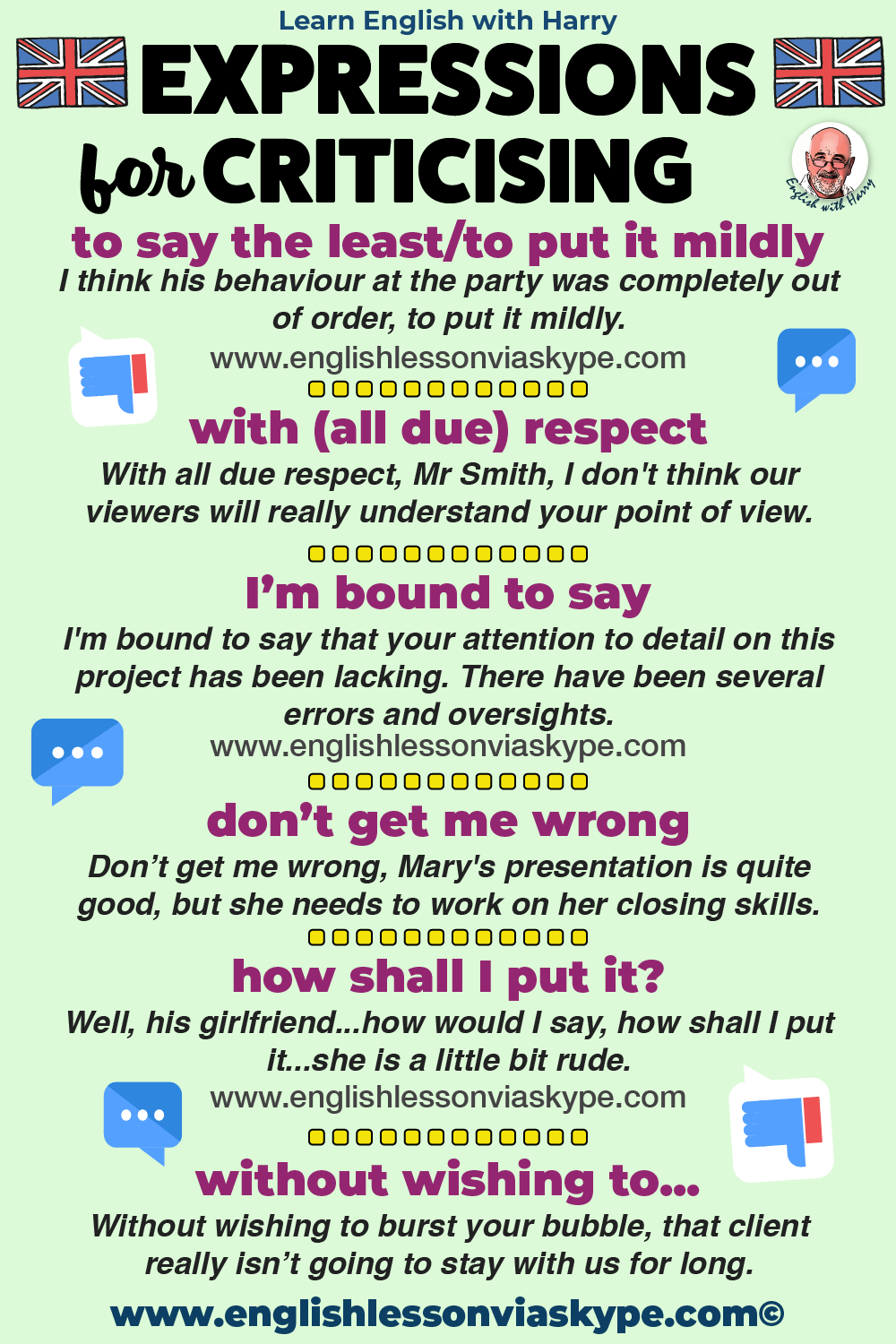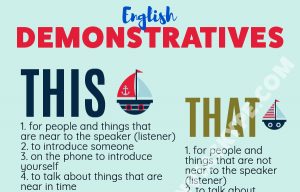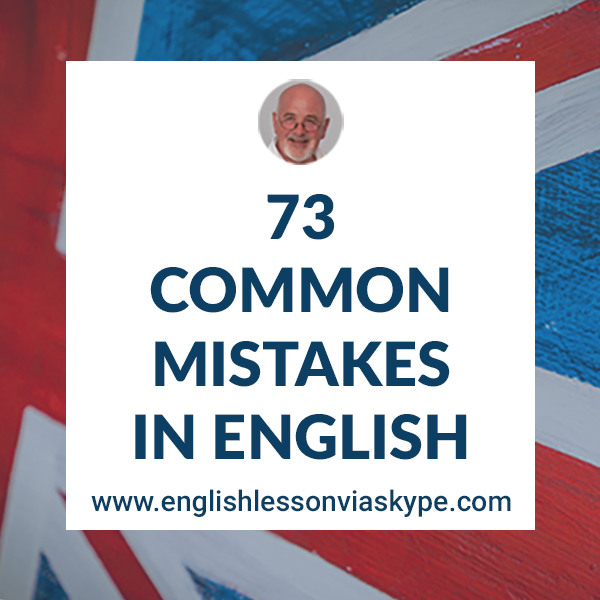Learn useful phrases for criticising in English. Formal and informal phrases.
Learn to criticise politely in English! Improve your English speaking skills and master useful phrases for giving constructive criticism in formal and business settings, as well as in everyday conversations with friends and acquaintances. This lesson is perfect for advanced English learners seeking to enhance their fluency in daily interactions.
Listen to the podcast Speak Better English with Harry or watch it on YouTube at Learn English with Harry. englishclass101
Useful English phrases
Useful Phrases For Criticising In English
Harry
We’ll explore some English phrases and expressions that you can use when you need to criticise someone you know, whether it’s a colleague, friend, or acquaintance.
Primarily, we’ll focus on business English, which is especially helpful for individuals facing challenges in managing people or leading a team.
When it comes to offering criticism, it’s always best to do so politely. Shouting or screaming serves no purpose, as it may cause the person to stop listening, become upset, and ultimately disregard the message. Therefore, it is important to maintain a calm approach.
By utilising the expressions we’ll cover, you’ll be able to offer criticism in a polite and effective manner, increasing the chances that the recipient will understand the reasons behind your critique and how they can improve.
This is an advanced English lesson with two parts. The first part will primarily focus on formal business English, while the second part will delve into criticism in more familiar contexts.
Now, let’s begin.
improve english on a budget
Online English Courses from €7.99
I have to say/I’m bound to say
Meaning: we want to say sth that may annoy the person that we’re talking to
Examples:
I’m bound to say, I found your written response to our client’s query a little short of the mark.
I’m bound to say that your attention to detail on this project has been lacking. There have been several errors and oversights.
with (all due) respect
Meaning: we’re going to disagree with somebody in particular, and we want to be polite
Examples:
With all due respect, Mr Smith, I do think that you are being very unreasonable.
With all due respect, Mr Smith, I don’t think our viewers will really understand your point of view.
With all due respect, Michael, I do think you need to take a little bit more care with your appearance.
to say the least/to put it mildly
Meaning: we want to suggest that sth is actually worse than what we are saying it
Examples:
I think his behaviour at the party was completely out of order, to put it mildly.
I found the meal in that restaurant last week absolutely disgusting, to say the least.
Useful Phrases For Criticising In English

shall we say
Meaning: we want to be not so offensive, and we don’t want to sound too severe
Examples:
Your timekeeping, shall we say, leaves a lot to be desired.
Your timekeeping, shall we say, is not up to the level of other people.
don’t get me wrong
Meaning: we want to make sure that someone understands your comments as correctly as possible
Examples:
Don’t get me wrong, Mary’s presentation is quite good, but she needs to work on her closing skills.
Don’t get me wrong, David is really good, but he tends to talk too much and he doesn’t listen.
how shall I put it?/let me put it this way
Meaning: you want people to understand that you’re being honest, but it may sound unkind
Examples:
Well, his girlfriend…how would I say, how shall I put it…she is a little bit rude.
Her new boyfriend…let me put it this way…he doesn’t seem suitable for her at all.
book your trial English Lesson
without wishing to…
Meaning: we use this when we are going to say sth that the other person may not like
Examples:
Without wishing to hurt your feelings, I think you need to put a little bit more effort into this presentation.
Without wishing to burst your bubble, that client really isn’t going to stay with us for long.
You should have… (+ past participle)
Meaning: someone was expected or advised to do sth in the past but didn’t
Examples:
You should have called me before you agreed to allow her to take some holidays.
You should have asked me before using my credit card. I’d like to know how you’re spending my money.
you shouldn’t have… (+ past participle)
Meaning: we express disapproval or regret about a past action that someone performed
Examples:
You shouldn’t have completed that side of the contract without me being aware of it.
You shouldn’t have taken my car without my permission.
Useful Phrases For Criticising In English

why didn’t you… (+ infinitive)
Meaning: use it to express surprise or disappointment that they did not take a particular action
Examples:
Why didn’t you ask me first? It would have been better to ask me for money instead of borrowing from a friend.
Why didn’t you go to your mother and ask her for some money?
Why didn’t you call me last night as you promised?
Why didn’t you call me last night to let me know that you were staying overnight at your friend’s?
✅ provide constructive criticism
✅ soften your criticism with a compliment
Be careful, as they can be received as a backhanded compliment, meaning they may initially appear to be a compliment or praise but contains a subtle, often negative, or undermining message.
Here are some phrases that you can use.
I appreciate your hard work but…
Meaning: used as a transition before introducing a point of concern or suggesting areas for improvement
Example:
I appreciate your hard work, but we just need to put in a bit more effort to get it closed.
I can tell you put a lot of effort into…
Meaning: use it to express disappointment or dissatisfaction while recognising the person’s effort
Examples:
I can tell you put a lot of effort into this project, but it probably needs some input from a senior manager.
I can see you put a lot of effort into your studies, but are you sure you’re studying in the most effective way?
I enjoyed your presentation today
Meaning: we are criticising but we’re also giving a compliment
Example:
I enjoyed your presentation today, but I thought it was a bit too long.
overall, it’s good, but…
Meaning: use it to provide feedback with a balanced perspective, highlight both the strengths and weaknesses
Example:
Overall, it’s good, but I think you just need to improve the beginning.
Here are some phrases you can use to provide constructive criticism.
I find it helpful to…
Meaning: use it to express a personal perspective or approach that has been effective in the past
Example:
I find it helpful to have somebody else read my emails before I send them to the client.
if you’re unsure in the future, just…
Meaning: offer a practical solution or course of action to handle uncertainty
Example:
If you’re unsure in the future, just ask me, and I will gladly read it and give you some hints.
So as always, have a look at this, and practise using them. Get a chance if you have to be critical. Try to use some of them in your office or in ordinary relationships with people.
If you need any more help, then contact me at www.englishlessonviaskype.com. Very happy to hear from you and very happy to give you any further assistance that you need.
Okay, well, thanks for listening and thanks for watching. And as always, make sure to join me for the next lesson.
speak better English with Harry podcast- episode 435
more information
For more information on English grammar rules, English collocations and English idioms, check out the links below:
Difference between Seem, Look and Appear
Better ways to say “You’re wrong” in English
You can always study English advanced level at Learning English with the BBC and British Council Learn English.
You will love these English lessons

How to Talk About Bad Experiences in English
Learn how to talk about bad experiences in English. This lesson is perfect for non-native speakers who want to enhance


English Demonstrative Pronouns THIS THESE THAT THOSE
This, that, these, those find out how to use demonstrative…


English Vocabulary Words Related to Repair or Renovation
Learn English vocabulary words related to repair or renovation. Talk about your DIY projects in English with confidence. English Vocabulary


